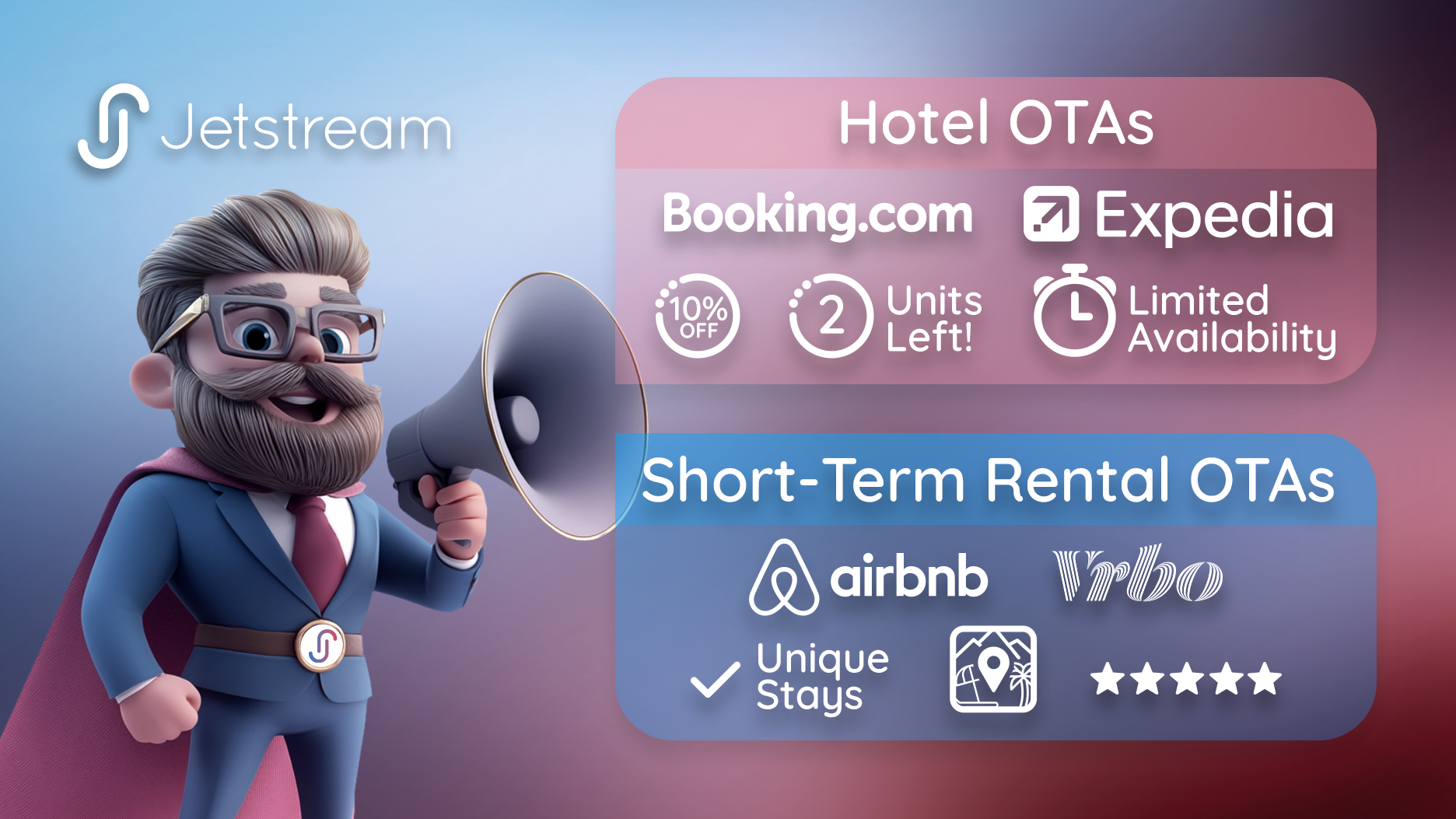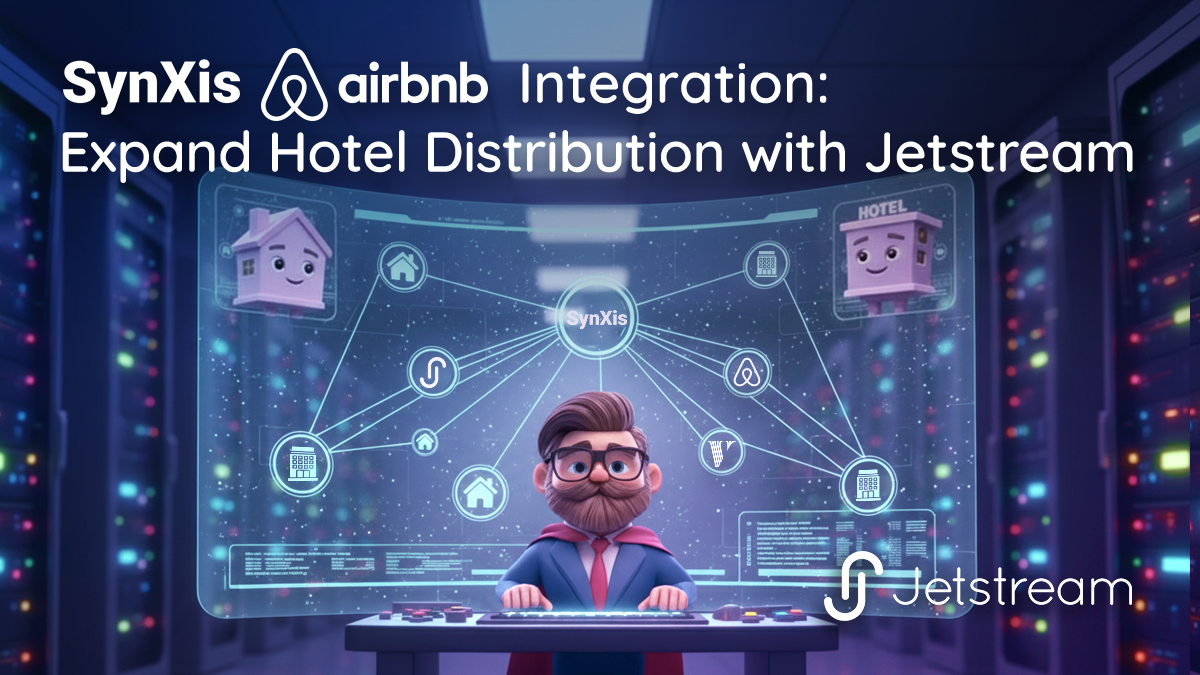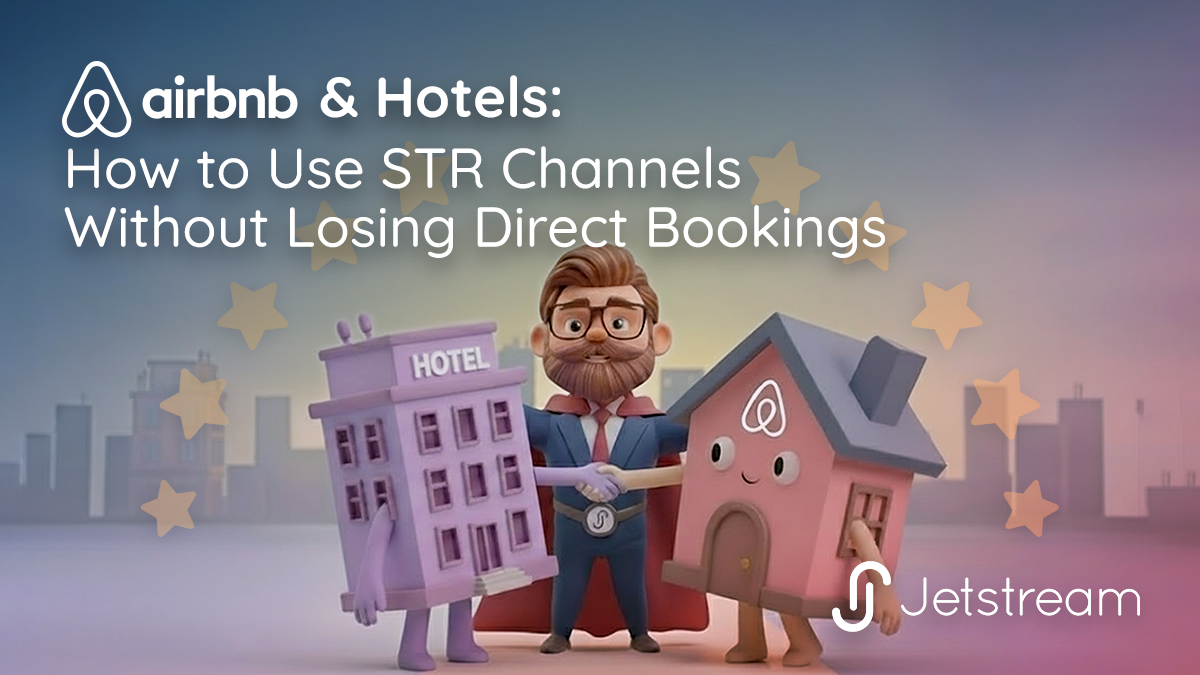4 min read
The differences between short term rental and hotel OTA’s
Jetstream
May 7, 2025 7:36:38 AM

Contrasting Short-Term Rental and Hotel-Oriented OTAs: Key Differences in Strategy and Execution
The online travel agency (OTA) market is a dynamic and evolving landscape, catering to the unique needs of both short-term rental hosts and traditional hotels or resorts. Platforms such as Airbnb and VRBO prioritize the short-term rental segment, while Booking.com and Expedia cater primarily to hotels and resorts. While their shared objective is to facilitate seamless overnight bookings, the underlying strategies and functionalities of these OTAs differ markedly. This article explores these distinctions in-depth, with insights from a hospitality expert with 25 years of experience.
1. Merchandising: Search Results, Promotions, and Visual Presentation
Search Results Display
Airbnb and VRBO emphasize a map-centric approach, dedicating substantial screen space to maps to showcase listings in the context of their surroundings. Listings are presented at the individual unit level, offering key details such as photos, descriptions, reviews, and pricing. This focus on unique, standalone properties is central to their appeal.
Conversely, Booking.com and Expedia group listings by property or resort, presenting consolidated options such as room types and prices under a single entry. Search results are often sorted by the lowest available price, and while maps are included, they occupy far less screen space compared to short-term rental OTAs.
Merchandising Discounts and Promotions
Short-term rental platforms like Airbnb and VRBO take a subtle approach to promotions, typically integrating long-stay discounts directly into pricing without overtly highlighting savings. On the other hand, Booking.com and Expedia prioritize promotions, using tools like strike-through pricing, starbursts, and urgency messaging (e.g., “Only 2 rooms left!”) to drive conversions.
Photos and Image Order
For short-term rental OTAs, hosts have full control over which photos are displayed and their order. This allows hosts to craft a visual narrative, often emphasizing unique property features or experiences. In contrast, Booking.com and Expedia rely on algorithms to select a "hero" image that aligns with guest preferences and platform performance metrics. This automated approach can sometimes lead to differences in which features are highlighted.
Factors Affecting Prominence in Search Results
- Airbnb and VRBO: Algorithms prioritize guest reviews, host responsiveness, and new listing status. New listings often receive a temporary boost to encourage early engagement and reviews.
- Booking.com and Expedia: Factors like pricing competitiveness, commission rates, and participation in promotional programs determine search rankings. Both platforms also offer paid advertising options to increase visibility.
2. Promotional Flexibility and Rate Structures
Short-term rental OTAs offer limited promotional tools, usually focused on discounts tied to specific durations. Airbnb supports long-stay discounts and a few multi-rate options but imposes stricter criteria. In contrast, hotel-oriented OTAs provide more comprehensive rate management, allowing for dynamic adjustments, length-of-stay discounts, and promotional layering—ideal for complex revenue management strategies.
3. Merchant vs. Agent Models: Payment Collection Practices
Merchant of Record vs. Agent
- Airbnb: Functions as the merchant of record, collecting payment at booking and disbursing funds (less fees) to hosts after check-in.
- VRBO: Primarily operates as an agent, leaving payment processing to hosts or property managers. VRBO will be changing to a merchant of record model in late 2025, early 2026.
- Booking.com: Offers flexibility, enabling hotels to act as merchants or allowing Booking.com to handle payments directly.
- Expedia: Primarily acts as the merchant of record, simplifying transactions for hotels but reducing their control over payment processes.
Payment Timelines
Short-term rental OTAs often collect payment upfront or in installments before arrival. Hotel OTAs provide flexibility, allowing guests to pay at booking, check-in, or check-out, depending on property preferences. This flexibility is a significant advantage for last-minute and business travelers.
Struggling to optimize across Airbnb, VRBO, Expedia, or Booking.com?
Talk to our team about boosting your OTA strategy.
4. Rate Parity Monitoring and Consequences
Hotel OTAs like Booking.com and Expedia enforce strict rate parity agreements, ensuring pricing consistency across channels. Non-compliance can result in penalties such as reduced visibility or delisting. In contrast, Airbnb and VRBO are more lenient, providing hosts with greater flexibility to adjust rates dynamically based on market conditions.
5. Cancellation Policies: Flexibility and Implementation
Policy Approaches
- Airbnb and VRBO: Offer hosts a menu of cancellation policies, ranging from very strict (non-refundable) to flexible (full refunds up to 24 hours before check-in). These policies, however, are static and cannot vary by season or promotion.
- Booking.com and Expedia: Provide extensive flexibility, allowing hotels to set seasonal policies or apply specific cancellation rules to individual rate plans. This enables properties to adopt stricter policies during peak seasons and more lenient ones during off-peak periods.
Promotional-Level Policies
Hotel OTAs support cancellation policies tied to promotions. For instance, a non-refundable discount rate can coexist with flexible standard rates, offering guests more choices while maximizing revenue opportunities. Short-term rental OTAs lack this level of customization.
6. Supply Connectivity and Distribution Support
Update Frequency and Availability Checks
Airbnb and VRBO integrate with property management systems for real-time updates and perform pre-booking availability checks to minimize overbookings. Hotel OTAs, while supporting similar integrations, occasionally skip pre-booking checks, relying on their internal systems to confirm availability.
Overbooking and Resolution
- Airbnb and VRBO: Place responsibility on hosts to resolve overbookings, often penalizing repeated infractions.
- Booking.com and Expedia: Take a more active role, offering guest compensation or alternative accommodations while holding hotels accountable for honoring bookings.
7. Reviews: Trust and Feedback Mechanisms
Review Systems
- Airbnb and VRBO: Employ two-sided review systems, allowing hosts to rate guests in addition to guests reviewing hosts. This fosters accountability and enables hosts to vet future bookings based on guest behavior.
- Booking.com and Expedia: Focus on one-sided reviews, emphasizing the guest’s perspective. Reviews are often paired with badges or accolades to highlight exceptional properties.
Merchandising High Scores
High ratings are prominently featured across all platforms. Airbnb highlights "Superhost" status, while Booking.com’s "Genius" program and Expedia’s filters reward high-rated properties with increased visibility and search prominence.
8. Loyalty Programs: Building Guest Retention
Approaches to Loyalty
- Airbnb: Does not offer a loyalty program, focusing instead on creating unique experiences to encourage repeat bookings.
- VRBO: Recently integrated with Expedia’s "One Key" program, allowing guests to earn and redeem points across Expedia platforms.
- Booking.com and Expedia: Feature comprehensive loyalty programs. Booking.com’s "Genius" program offers exclusive discounts and perks, while Expedia’s "One Key" program rewards travelers with redeemable points.
Customization for Properties
Hotel OTAs allow properties to opt into loyalty programs and customize their offerings. For instance, hotels can provide deeper discounts to Genius members or unique perks to Expedia’s top-tier travelers.
9. Cost Presentation: Transparency and Guest Perception
Short-Term Rental OTAs
Airbnb and VRBO emphasize total stay costs upfront, including cleaning and service fees. This transparency aligns with traveler expectations but can make prices appear higher at first glance.
Hotel OTAs
Booking.com and Expedia often lead with nightly rates, revealing additional fees later in the booking process. While this approach attracts budget-conscious travelers, it can create friction if the final cost significantly differs from the initial quote.
Conclusion
The operational and strategic differences between short-term rental OTAs and hotel-oriented OTAs reflect their unique target audiences and business models. By understanding these nuances, hospitality providers can tailor their approach to maximize bookings and guest satisfaction. From leveraging Airbnb’s emphasis on experiential travel to capitalizing on Booking.com’s promotional tools, aligning with platform-specific strengths is essential.
As the OTA landscape continues to evolve, hospitality professionals must adapt their strategies to navigate this complex ecosystem effectively, ensuring sustainable growth and competitive advantage.
Ready to grow your revenue across all major OTAs?
Our top picks |
|
|

READ: How Jetstream Powers Vail Resorts’ Airbnb and VRBO Strategy |

WATCH: CEO of Jetstream Shares Growth Tips for Airbnb & VRBO |



